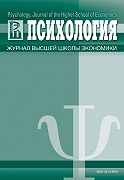The Influence of Mind Wandering on Performance in The Condensation Task: Behavioral Analysis in The Framework of Cognitive Control Paradigm
Abstract
The state of mind-wandering is related to complete or partial detachment of attention from external information. Under this state, attention switches from the ongoing primary task towards unrelated thoughts, fantasies and feelings. Current understanding of the role of cognitive control in the initiation and maintenance of the state of mind-wandering is ambiguous, and the specific mechanisms of deterioration in the quality of performance in ongoing activity are not clear. The aim of this study was to identify changes in the ongoing task performance under the state of mind-wandering, and to find the main cause of error commission during this state – whether it is a reduction in the motor threshold, or weakening of specific representations involved in the execution of the ongoing task. The current study employed an auditory condensation task; performance accuracy and response times were analyzed. The state of mind-wandering was probed by way of inquiry interrupting the experiment. During the state of mind-wandering, as compared to the on-task state, task performance accuracy decreased, and pre-error speeding, as well as error slowing effects were abolished. The current findings demonstrate that under a state of mind-wandering the level of cognitive control involved in the ongoing external task performance decreased. The pattern of behavioral measures obtained hints that the basic mechanism of performance deterioration is related to the weakening of specific representations involved in task performance, rather than to a drop in the motor threshold.





